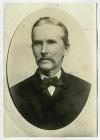ONCE, when the autumn fields were dim and wet,
The trumpets rang; the tide of battle set
Toward gray Broceliande, by the western sea.
In the fore-front of conflict grimly stood,
Clothed in dark armor, Tristram of the Wood,
And round him ranged his knights of Brittany.
Of lordlier frame than even the lordliest there,
Firm as a tower, upon his vast destrere,
He looked as one whose soul was steeped in trance.
Ne'er spake nor stirred he, though the trumpet's sound
Echoed abroad, and all the glittering ground
Shook to the steel-clad warriors' swift advance;
Ne'er spake nor stirred he, for the mystic hour
Closed o'er him then; the glamour of its power
Dream-wrought, and sadly beautiful with love--
Love of the lost Iseult. In marvellous stead
Of thronging faces, with looks stern and dread,
Through the dense dust, the hostile plumes above,
He saw his fair, lost Iseult's passionate eyes,
And o'er the crash of lances heard her cries,
Shrill with despair, when last they twain did part.
While others thrilled to strife, he, thrilled with woe,
Felt his life-currents shuddering cold and low
Round the worn bastions of his broken heart.
Then rolled his way the battle's furious flood;
Squadrons charged on him blindly; blows and blood
Showered down like hail and water; vainly drew
The whole war round him; still his broadsword's gleam
Flashed in death's front, and still, as wrapped in dream,
He fought and slew, witting not whom he slew,
Nor knew whose arm had smitten him deep and sore--
So deep that Tristram never, never more
Shone in the van of conflict; but the smart
Of his fierce wound tortured him night and day,
Till, through God's grace, his life-blood ebbed away,
And death's sweet quiet healed his broken heart.






